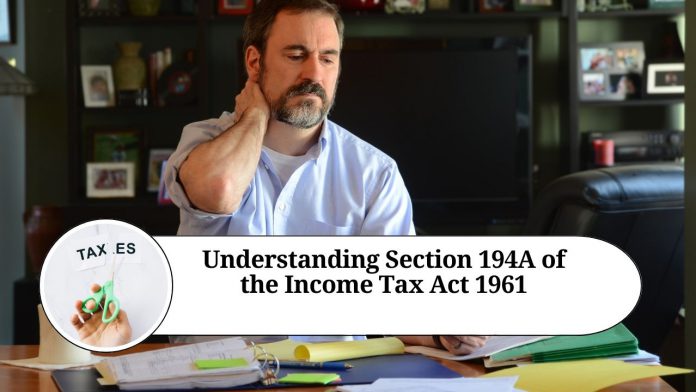Section 194A of the Income Tax Act 1961 pertains to the deduction of tax at source (TDS) on interest payments. As per this section, any person responsible for paying interest to a resident individual or Hindu Undivided Family (HUF) is required to deduct TDS at the time of payment.
In this blog, we will take a closer look at the provisions of Section 194A and understand its applicability, rates, and exemptions.
Applicability of Section 194A Section 194A applies to interest payments made by any person, except for individuals and HUFs who are not required to get their accounts audited under section 44AB of the Income Tax Act. The section is applicable to the following types of interest payments:
- Interest on fixed deposits with banks and post offices
- Interest on securities, debentures, and bonds
- Interest on loans and advances
- Interest on deposits with companies, co-operative societies, and other entities
Rate of TDS under Section 194A The rate of TDS under Section 194A depends on the type of interest payment and the status of the payee. The following table summarizes the applicable rates:
| Type of interest payment | Rate of TDS for Resident Individuals and HUFs | Rate of TDS for Other Persons |
|---|---|---|
| Interest on fixed deposits with banks and post offices | 10% | 20% |
| Interest on securities, debentures, and bonds | 10% | 20% |
| Interest on loans and advances | 10% | 20% |
| Interest on deposits with companies, co-operative societies, and other entities | 10% | 10% |
Exemptions under Section 194A There are certain exemptions under Section 194A that allow the payee to receive interest income without any deduction of TDS. The following are the main exemptions:
- Senior citizens: Resident individuals who are 60 years or older during the relevant financial year can avail exemption from TDS on interest income up to Rs. 50,000 from all sources.
- Exemption for certain securities: TDS is not applicable on interest income from certain securities such as 8% Savings (Taxable) Bonds, 2003, 7.75% Savings (Taxable) Bonds, 2018, and National Savings Certificates (VIII Issue).
- No TDS for small interest income: TDS is not required to be deducted if the total interest income during the financial year does not exceed Rs. 40,000 for resident individuals and HUFs.
Conclusion
Section 194A of the Income Tax Act 1961 is an important provision that governs the deduction of TDS on interest payments. It is important for both payers and payees to understand the provisions of this section to ensure compliance with tax laws. The rates and exemptions under Section 194A are subject to change from time to time, and it is advisable to stay updated with the latest changes to avoid any penalties or legal hassles.
Read more useful content:
- section 234e of income tax act
- section 286 of income tax act
- section 90a of income tax act
- section 40a(7) of income tax act
- section 226(3) of income tax act
- section 24 of income tax act
Frequently Asked Questions (FAQs)
Q. What is Section 194A of the Income Tax Act 1961?
Section 194A of the Income Tax Act 1961 is a provision that governs the deduction of tax at source (TDS) on interest payments. It requires the person responsible for making the interest payment to deduct TDS at the time of payment.
Q. Who is responsible for deducting TDS under Section 194A?
The person responsible for making the interest payment is required to deduct TDS under Section 194A. This could be a bank, post office, company, co-operative society, or any other entity that makes interest payments.
Q. What types of interest payments are covered under Section 194A?
Section 194A applies to various types of interest payments, including interest on fixed deposits with banks and post offices, interest on securities, debentures, and bonds, interest on loans and advances, and interest on deposits with companies, co-operative societies, and other entities.
Q. What are the rates of TDS under Section 194A?
The rate of TDS under Section 194A depends on the type of interest payment and the status of the payee. For resident individuals and Hindu Undivided Families (HUFs), the rate of TDS is 10% for most types of interest payments. For other persons, the rate of TDS is generally 20%.
Q. Are there any exemptions from TDS under Section 194A?
Yes, there are certain exemptions under Section 194A that allow the payee to receive interest income without any deduction of TDS. For example, senior citizens can avail exemption from TDS on interest income up to Rs. 50,000 from all sources, and TDS is not applicable on interest income from certain securities.
Q. Is TDS required to be deducted if the interest income is below a certain threshold?
Yes, TDS is required to be deducted even if the interest income is below a certain threshold. However, there are certain exemptions available for small interest income, and TDS is not required to be deducted if the total interest income during the financial year does not exceed Rs. 40,000 for resident individuals and HUFs.
Q. Can the payee claim a refund of TDS deducted under Section 194A?
Yes, the payee can claim a refund of TDS deducted under Section 194A if the actual tax liability is lower than the TDS deducted. This can be done by filing an income tax return and claiming the refund.
Q. Is it possible to avoid TDS under Section 194A?
It is not possible to avoid TDS under Section 194A if the interest income is subject to TDS. However, the payee can reduce the amount of TDS by providing a valid Form 15G or Form 15H if they meet certain criteria.




















